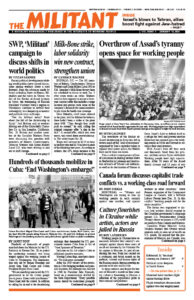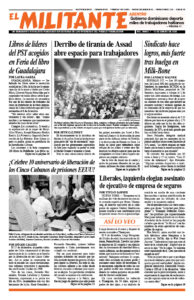BUFFALO, N.Y. — The 165 members of Bakery, Confectionery, Tobacco Workers and Grain Millers Local 36G at J.M. Smucker’s Milk-Bone factory here are scheduled to return to work Jan. 2 after seven weeks on strike. Workers voted in their majority to accept a three-year contract offer that includes a wage increase and pushes back some of the company’s demands for union members to pay more for health care coverage.
Steve Palumbo, chief union steward in the plant, told the Militant he believes there hadn’t been a strike at the plant since 1968. “They thought they could push us around,” he said, calling the original company offer “a slap in the face.” A second offer, which was even worse, was voted down overwhelmingly. The strike began Oct. 28.
Wages will increase by $2.25 an hour in the first year and $1.75 an hour in each of the following two years. According to strikers, the 20% wage increase is the largest they have ever received.
The union pushed back some company demands around health care costs. Palumbo said increases in medical premiums are now capped at 10% per year. “The original offer had them uncapped, so the company could have raised them as much as it wanted.”
The strikers also defeated the company’s demand for a $200 a month “surcharge” if a spouse chooses the Milk-Bone health coverage, even if they could get insurance from their own employer. “We knocked that right off,” Palumbo said. “Local 36G members are the only ones in the entire company, over 9,000 employees, that doesn’t have to pay this. Even the managers pay it.” Very few Smucker’s workers nationally are unionized.
The contract was voted up 82 to 57. “We were 25 votes apart,” Palumbo said. “Some were willing to stay out, others saw the reality of what we would lose, and it was hard before the holidays.”
“I was prepared to be out there until next year,” said Cathy Kennedy, a worker in the plant for 21 years. She said that maybe they couldn’t get the company to budge on insurance, but the workers could get a larger raise.
“The conditions we work under are also important, they can’t keep people, so we’re always working shorthanded. The junior people are only getting two days off a month. A lot of them are young people with small kids,” Kennedy said. “They can force us to work 16 hours with no limit and then you have to come back in eight hours for your regular shift.
“If you say no to the overtime, you get attendance points. In the summer, it’s generally 100 degrees or hotter in there, people have passed out,” she added.
“We have to respect the vote, it was a democratic vote of the union,” Tony Serra, one of the picket captains, told the Militant. “We don’t have to agree with it. The picket line was strong.”
Solidarity crucial
“The SOLIDARITY of the Labor Movement was vital to this victory,” BCTGM International President Anthony Shelton said in a statement. Talking to strikers here brought that home.
“When we went out,” Serra said, “the solidarity was phenomenal. The autoworkers here were great, the Teamsters and all they did. The school bus drivers were great. They don’t make that much money but they were always bringing doughnuts.”
Solidarity included union rail workers who brought in two railcars of flour early in the strike but refused to hook them up to the plant, Serra said. Two weeks later the railcars were taken away still loaded.
Other area unions, including the Communications Workers of America, the Teachers Federation, nurses and postal workers, regularly joined the picket line. Kennedy said, “We had more food donations than we could eat. We fed the neighbors.” She added, “I was floored by the out-of-state support.”
Melissa Straubel, executive board chairman of BCTGM Local 81 at a Sara Lee industrial bakery in Traverse City, Michigan, and Shantel Myers, the local’s recording secretary, drove nine hours to bring a carload of supplies to the picket line in late November. After they returned home, union members sold raffle tickets on the job, raising more than $900 for the strike.
“Organizing solidarity with the Milk-Bone strike really got us together in Local 81. Talking to our co-workers about the strike was a real door opener,” Straubel told the Militant. “They didn’t realize what a big union the BCTGM is and how we can have each other’s backs. We recruited more people to the union through this.” Local 81’s contract is up next December.
In response to an appeal by the BCTGM International, locals across the country raised contributions. The Southern Region of the BCTGM organized union members to pass out informational flyers on the strike outside a nonunion Smucker plant in Memphis, Tennessee. Officers of BCTGM Local 22 in Minneapolis passed out flyers at a Walmart in Fridley.
“I’ve been in the BCTGM for 38 years,” Serra said. “This solidarity opened my eyes, I’ve never seen this before. The next strike in Buffalo I am going to it and bringing something. If the workers at Sara Lee in Michigan go on strike, we’re going to Traverse City. We’ll get four or five of us in a truck.”
Kennedy and Serra agreed that the strike had strengthened Local 36G. “Inside we weren’t all friends, but everyone pulled together on the picket line,” Kennedy said.
“We saw the strong character of some union members that we hadn’t seen before,” Serra added. “They were leaders, stepped forward, spoke to the media. I was so impressed. We saw a lot of future leaders.
“One of our members told me that she believes that since we all went out together united and stayed united and then voted, now we must go back to work united,” he said. “I agree with that.”
Steve Palumbo told the Militant, “This strike puts us in a stronger situation in three years at the end of this contract.”

